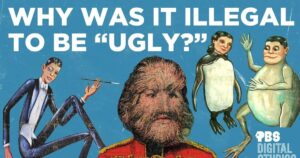by Claudia Alick, Calling Up Justice
“No person who is diseased, maimed, mutilated or in any way deformed so as to be an unsightly or disgusting object or improper person to be allowed in or on the public ways or other public places in this city… shall…expose himself to public view.” -Chicago municipal code 1881, example of a so-called “Ugly Law” https://www.pbs.org/video/why-it-was-illegal-to-be-ugly-c8ps4i/
I’ve been thinking a lot lately of, well, two things.
The first is the impact of the Ugly Laws. The second is, as always, about power and cultural producing.
The Ugly Laws were taken off the books, but they were never really taken away.
I have lived my life in particular ways, because I was avoiding the repercussions of a world where Ugly Laws existed; like, a bunch of stuff that I was doing that I would now mark as internalized ableism.
It was just me understanding that if I am a coded as being societally “ugly” in specific ways that I will not receive the care and treatment I need. So, I told myself, “I have to be the most attractive sick person, the most able-bodied-looking sick person.” Adding on to that, I also am expected to complain about not being able to aerial dance and do exercise shit. So that people really know that I’m one of the good ones, the one that they should save.
Then I also think in terms of cultural producing: who gets represented, and what do we learn about what is beautiful? We are taught to avoid what is unattractive to us. We are also given what’s available to us.
We learn that two legs that can walk, that is attractive. And beautiful hair that is luscious and full and all over the head, that is attractive. And to be a beautiful body you control your caloric intakes and somehow not starve to death, that is attractive and beautiful.
It’s all about subtly coercing us into just understanding that if you want to survive that you’d better be pretty, and a particular kind of pretty. And if you’re not, you must complain about wanting to be that way to fit in, have your needs met, and be in public spaces. But that’s American society right? American society needs us to perform that.
But I’m also thinking about the fact that we’re collaborative meaning-makers, like that’s what humans are. Maybe one of the most revolutionary things we can do is to make cultural productions where things that society says aren’t pretty are, instead, celebrated.Adapted from a transcript of conversation in Crip Create on August 10th by Access Artist Grant Miller of The Curiosity Paradox.

